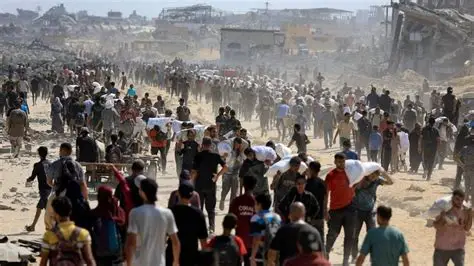The worst-case scenario of famine is currently playing out in the Gaza Strip.
Hunger is biting deep, and people are dying en-masse in the worst disaster to ever been documented in recent times.
This is according to the alert recently published by the Integrated Food Security Phase Classification (IPC).
People are going without food for days.
Others are dying as their undernourished, weakened bodies succumb to disease or organ failure.
The health system, normally a source of sustenance and relief, is also starved of essential medical supplies, fuel, and other necessities to function fully.
Humanitarian and health workers are also weak from hunger.
Dying of starvation is slow and painful.
A starving child, among the most vulnerable, might cry constantly from pain until becoming too weak to even do that.
If not urgently treated, a child with acute malnutrition will die.
To stop the dying and reverse this man-made tragedy will take months, if not years, according to the World Health Organization (WHO).
Recovery for a malnourished person takes specialized medical attention, correct therapeutic feeding and supplementation.
In some severe cases, consequences are lifelong, from stunted growth and impaired brain development to other lasting health complications.
While the Integrated Food Security Phase Classification (IPC) partners, including WHO, will conduct further assessments, the gravity of the situation is clear.
Food, medicines and other aid must be allowed in immediately, at scale, through all possible routes. United Nations partners have such supplies ready and waiting at the border.
The World Health Organization has called on Israel to urgently facilitate the United Nations and other humanitarian actors by ensuring safe, rapid and unhindered access to delivery and distribution of aid.
“As ever, our call is to end the suffering. Our colleague who remains in detention must be released. Hostages must be released. Ultimately and always, our call is for a ceasefire. Peace is the first step to recovery,” says the WHO statement.
The IPC is a partnership of 21 organizations, including WHO, who work together to determine the severity and extent of acute and chronic food insecurity and acute malnutrition situations within countries, according to internationally recognized standards.

